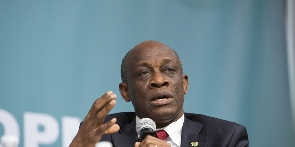 Seth Terkper, former Finance Minister
Seth Terkper, former Finance Minister
Seth Terkper, former Finance Minister, has urged the government to be transparent as much as possible with data on revenue, expenditure and arrears in order not to delay getting an economic programme from the International Monetary Fund (IMF). Speaking at a media dialogue on Ghana’s negotiations with the IMF in Accra on Friday, Mr Terkper, according to myjoyonline.com, said if the government failed to exhibit transparency with the data, the country would not get the programme as expected on time, and that would hurt the economy more. “What has dominated the discussions during the first round and going into the second round is a possible debt restructuring, refinancing or however you may call it. And, we will give some examples, and that is because we all know that debt is a problem that faces the nation. But I also want to remind us that debt is the outcome of raising revenue and borrowing beyond that revenue to the point we are in debt distress….there should be no question about that. And therefore, we have also faced downgrades.” He mentioned that a typical IMF programme would start from revenue, expenditure, and management of arrears “to give us the fiscal balance and go all the way to the fiscal and go into debt – where we are facing the difficulty.” He said, “Everything shows clearly that we are protecting certain expenditures as seems to be what is coming from some government officials, then the Fund [programme] is a non-starter. Because it means that you are saying that the Fund gives you money to continue with the pattern of your behaviour. You should know that the Fund knows it all; if you read Article 4, they follow our debates, they know what is going on, they have an office here,” Mr. Terkper said. He further pointed out that a fast programme from the IMF would depend on whether the country could provide all the available data for scrutiny and approval. “So I think whether we can do a fast programme or not depends on whether we can lay it all on the table. It can be shocking, but we need to lay all on the table,” he added. Seth Terkper also dismissed the perception that the rating agency have been harsh to developing countries, saying the developed countries have not been left out of the equation, citing the United Kingdom as an example.
Seth Terkper, former Finance Minister, has urged the government to be transparent as much as possible with data on revenue, expenditure and arrears in order not to delay getting an economic programme from the International Monetary Fund (IMF). Speaking at a media dialogue on Ghana’s negotiations with the IMF in Accra on Friday, Mr Terkper, according to myjoyonline.com, said if the government failed to exhibit transparency with the data, the country would not get the programme as expected on time, and that would hurt the economy more. “What has dominated the discussions during the first round and going into the second round is a possible debt restructuring, refinancing or however you may call it. And, we will give some examples, and that is because we all know that debt is a problem that faces the nation. But I also want to remind us that debt is the outcome of raising revenue and borrowing beyond that revenue to the point we are in debt distress….there should be no question about that. And therefore, we have also faced downgrades.” He mentioned that a typical IMF programme would start from revenue, expenditure, and management of arrears “to give us the fiscal balance and go all the way to the fiscal and go into debt – where we are facing the difficulty.” He said, “Everything shows clearly that we are protecting certain expenditures as seems to be what is coming from some government officials, then the Fund [programme] is a non-starter. Because it means that you are saying that the Fund gives you money to continue with the pattern of your behaviour. You should know that the Fund knows it all; if you read Article 4, they follow our debates, they know what is going on, they have an office here,” Mr. Terkper said. He further pointed out that a fast programme from the IMF would depend on whether the country could provide all the available data for scrutiny and approval. “So I think whether we can do a fast programme or not depends on whether we can lay it all on the table. It can be shocking, but we need to lay all on the table,” he added. Seth Terkper also dismissed the perception that the rating agency have been harsh to developing countries, saying the developed countries have not been left out of the equation, citing the United Kingdom as an example.